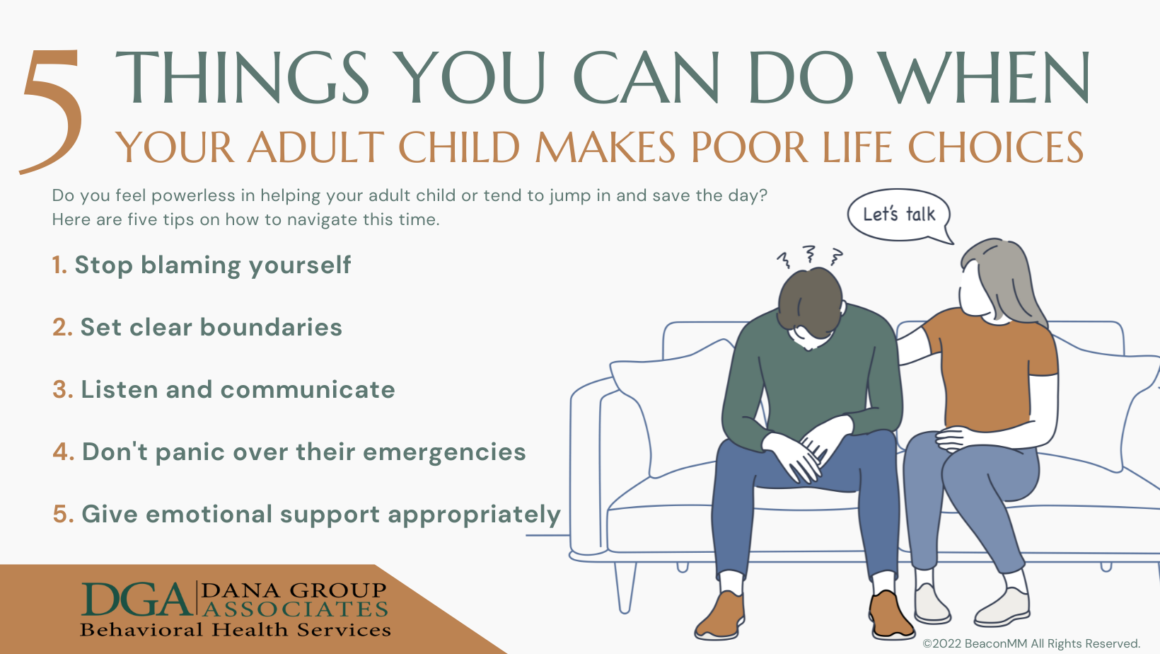When an adult child makes poor life choices, it can be extremely difficult for the parents. You might blame yourself, try to “fix” their life, or damage your financial health as you pour money into meeting their needs. Here’s what you can do to help the kids as well as yourself.

Do you need help dealing with your adult child’s poor choices? Schedule an appointment with Dana Group for counseling.
Stop Blaming Yourself
The bond between parent and child continues and changes over the years. During a child’s formative years, you have a major challenge to teach them how to survive and thrive once they are on their own. No parent is perfect, but you likely did many things right.
It’s easy to blame yourself when an adult child makes poor life choices. Most parents take that burden on themselves at some time. The truth is that even if you did do everything perfectly, adult children need to learn how to do life on their own. Will they make mistakes? Will they choose the wrong relationships? Could they make choices that you don’t understand? Almost definitely! But this is how they learn, grow, and mature after they are adults.
What’s more, blaming yourself only makes matters worse. So, before you tell yourself, “This is my fault,” remember that your child is an adult now. It’s their responsibility to make their own choices. You can be there for emotional support, guidance, and empathy. But you can’t live their life for them, so let them do it without punishing yourself.
Are you wondering how to get past self-blame? Schedule an appointment with Dana Behavioral Health.
Set Clear Boundaries
Boundaries are always important, but once the child becomes an adult, you might find that boundaries are difficult to set and maintain. Yet, it’s one of the most important tasks that parents face. Tell your adult child what you do and don’t feel comfortable doing for them. What should you set boundaries around? Here are a few examples of what you might require of your adult children:
- Be respectful to you in your home.
- Don’t ask for money to fix their mistakes.
- Take responsibility for their poor choices.
- Do not borrow things you need for yourself, such as a car.
With firm boundaries in place, the next step is to enforce them. Just as they did when they were very young, they may test boundaries. Your job is to repeat what you told them about boundaries and remind them that you have decided what is acceptable in your own home. At Dana Behavioral Health, we offer individual, couples, and group therapy to help you work on boundaries and other issues.
Listen and Communicate
You want the best for your children, but when an adult child makes poor choices, you might wonder how it happened. Ask your child about these poor choices. Why did they decide to do that? What were their other options? Are they happy with their choice so far? If not, how do they plan to approach the problem?
After you’ve done this active listening to understand them better, offer your insights based on your experience. Suggest ways they could make changes for the better now. Remind them it is their life to build, and you are happy to share your wisdom.
Don’t Panic Over Their Emergencies
When an adult child makes poor life choices, the situation can quickly feel like an emergency. Suppose your grown child doesn’t have the money to pay their rent. Your first response might be to pay it for them. Perhaps they were laid off from work and didn’t have enough for their bills. Helping them in an exceptional time of need might not be a terrible thing.
However, if it happens again and again, the financial drain from your own household could be significant. So, if month after month, your adult children come to you for rent money, you might be best off telling them no. Once they begin finding their own solutions, their maturity will increase, and they will become more self-sufficient. Remember: this is their emergency, not yours. So, be calm, think clearly, and put your own household’s well-being first.
Financial emergencies can be frustrating and anxiety-producing. Read our blog to find out how to stop stressing about money. The less stressed you are, the more easily you can slip into problem-solving mode.
Give Emotional Support Appropriately
Parents don’t want to see their children struggling emotionally. You might look at their life and feel immense empathy for them. You might even want to take all their worries away. Yet, you know you can’t do that. What can you do?
Be generous with your emotional support, encouragement, and praise for the good choices. Be there to listen and validate their struggles. Show them your kindness. At the same time, you need to let them know that you can’t fix their life. You can be compassionate, but you can’t undo their poor choices. In many cases, once they know you care, they will begin to work out their problems independently.
You can learn how to get and give emotional support as your children mature. Contact us at Dana Group to schedule your first appointment.
Protect Your Time and Schedule
When an adult child makes poor choices, they often become so needy that they interfere with your life. Certainly, there may be times when you don’t mind setting aside an activity to spend the time helping your child. The problem is that if you let them, they might take up all your time for as long as they benefit from your help.
So, when you are losing track of your own friends, canceling activities that are important to you, and never having a date night with your partner, you are probably giving too much. You can help them sometimes, but don’t be afraid to insist on having a life of your own beyond just being a parent.
Don’t Enable Bad Choices
There are some bad choices that can have a devastating impact on your child’s life. Maybe they get involved with drug or alcohol abuse, for example. Or, perhaps, they start gambling with their household bill money. When an adult child makes poor choices like this, you need to be very careful about helping them.
For instance, they may ask you for money to buy drugs, either directly or with a made-up story. Giving them money at a time like this could contribute to their addiction. So, if they request money, and you want to help, pay it directly to the utility company or the landlord, or buy them groceries. Never give cash to your child, especially when you know they have an addiction.
Sometimes, the bad choice your adult child makes is the partner that they choose. Be careful about bonding with their significant other too soon. Be kind, but also request that the partner treats you, your home, and your adult child with respect. If you notice anything abusive about the relationship, find a quiet time to talk to your child. Listen more than you speak, and be ready to offer the most appropriate types of help for both of you.
Preserve Your Financial Well-Being
When an adult child makes poor choices, it can tempt you to give them whatever you can. The first thing you need to do is find out exactly how much money you have at your disposal. Consider your own goals and dreams. Goal-setting is important to your mental health, and you deserve that as much as your child does.
Here are some tips for keeping yourself financially fit when your adult children ask for too much.
- Avoid going into debt to support your adult children. Too many parents use credit cards and loans to give their adult children more than they have in cash. Before you know it, you have more debt than you ever dreamed possible.
- Work on your budgeting. If you plan to give your children some money for something important, include that in your planning. Then, live by the budget. If they ask why you won’t give them money, you can say that you don’t have enough in your budget to give them.
- Figure out how much and how often you’ll help your adult child. Then, give them an absolute “no” when they surpass that amount.
Get Help for You If Needed
When an adult child makes poor choices, it can put their parents in a difficult spot. When you became a parent, you set your mind towards doing everything you could for them. Sometimes, it’s scary letting go and let them learn to solve their own adult problems.
Talking to a therapist helps you come to terms with your feelings about your children and about your own life. A counselor can give you more tips on how to manage the relationship with your child. They can assist and guide you as you search for the ideal balance between helping a child and tending to your own needs at the same time.
Once you understand the best ways to respect both your child and yourself, you can navigate your role in this relationship in a healthier way. In doing so, you give your child the room they need to make their own good choices and live a better life.
Could therapy help you get through a difficult time with your adult children? Reach out to Dana Behavioral Health for counseling.
